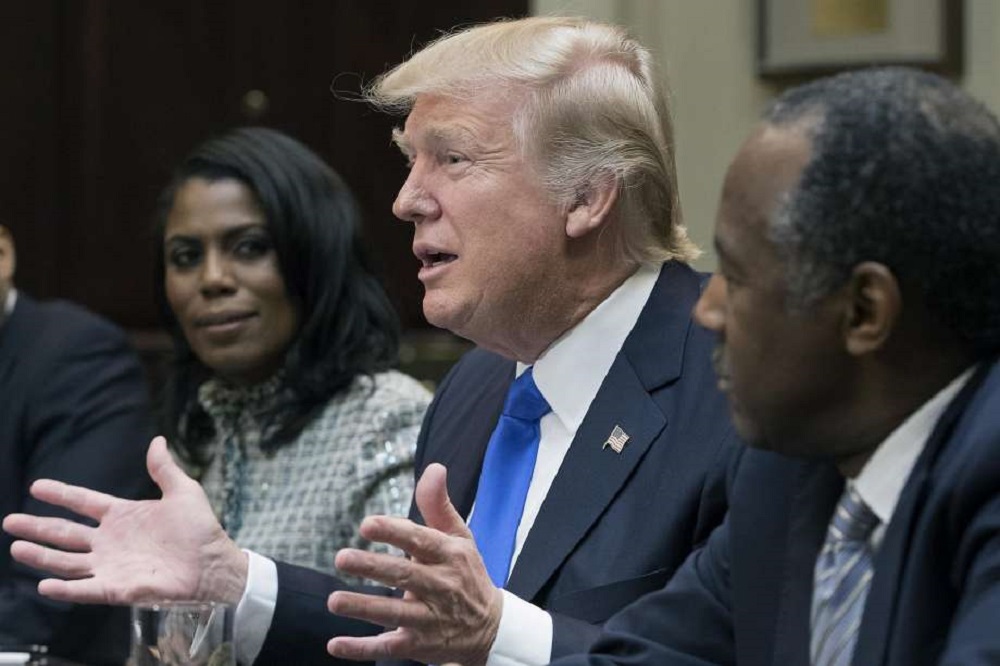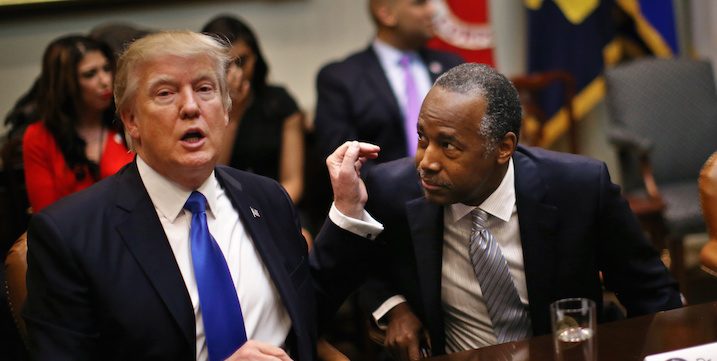
President Donald Trump tried to avoid messing up Black History Month like he did on International Holocaust Remembrance Day, but he chose a subject that sounded like he had just learned about it from Wikipedia. This left many people wondering if he actually knew who Frederick Douglass was.
While Trump did mention that he was a great abolitionist, former slave and suffrage campaigner on Wednesday in an oddly rambling empty feeling commentary.
“I am very proud now that we have a museum on the National Mall where people can learn about Reverend King, so many other things, Frederick Douglass is an example of somebody who’s done an amazing job and is getting recognized more and more, I notice. Harriet Tubman, Rosa Parks, and millions more black Americans who made America what it is today. Big impact.”
Many were expecting Omarosa Manigault to jump in and save the president, but she kept an odd smirk on her face while he stumbled through his thoughts.
Then within seconds, he was back off-topic talking about his three favorite subjects: CNN, himself, and his feud with CNN.
His comments about Martin Luther King were slightly less empty feeling, but some may find them even stranger. “Last month we celebrated the life Reverend Martin Luther King Jr., whose incredible example is unique in American history,” Trump said, employing a favorite meaningless adjective. But this wasn’t really about King. It was about Trump: “You read all about Martin Luther King when somebody said I took a statue out of my office. And it turned out that that was fake news. The statue is cherished. It’s one of the favorite things—and we have some good ones. We have Lincoln, and we have Jefferson, and we have Dr. Martin Luther King.”
Even beyond the strange aside about Douglass and the digression from King, Trump’s comments point to the superficiality of his engagement with African American culture. He named perhaps the four most famous figures in black history with no meaningful elaboration. Hey, he was able to remember Harriet Tubman’s name.
During Wednesday’s talk, Trump mentioned about doing so well with the black community, but a quick reminder. During his presidential campaign, he spoke about the black community and other minorities, but always with an awkward distance. At one rally he pointed out one man and said: “There’s my black.”
When Trump decided announced a black voter outreach operation, he mostly delivered his message to overwhelmingly white audiences in overwhelmingly white locales and employed a series of racist and outdated stereotypes about inner-city crime, poverty, and lack of education, in what he appeared to believe represented benign patronization.
In the end, Trump won 8 percent of the black vote, according to exit polling, besting Mitt Romney’s showing against Barack Obama but falling well short of the recent GOP high-water mark of 17 percent in 1976 (to say nothing of his prediction that he’d win 95 percent of African Americans).
It feels that Wednesday was the beginning of Black History Month, but the rest of February and every month will be President Donald Trump History Month.
President Donald Trump Black History Month speech:
Well, the election, it came out really well. Next time we’ll triple the number or quadruple it. We want to get it over 51, right? At least 51.
Well, this is Black History Month, so this is our little breakfast, our little get-together. Hi Lynn, how are you? Just a few notes. During this month, we honor the tremendous history of African-Americans throughout our country. Throughout the world, if you really think about it, right? And their story is one of unimaginable sacrifice, hard work, and faith in America. I’ve gotten a real glimpse—during the campaign, I’d go around with Ben to a lot of different places I wasn’t so familiar with. They’re incredible people. And I want to thank Ben Carson, who’s gonna be heading up HUD. That’s a big job. That’s a job that’s not only housing, but it’s mind and spirit. Right, Ben? And you understand, nobody’s gonna be better than Ben.
Last month, we celebrated the life of Reverend Martin Luther King, Jr., whose incredible example is unique in American history. You read all about Dr. Martin Luther King a week ago when somebody said I took the statue out of my office. It turned out that that was fake news. Fake news. The statue is cherished, it’s one of the favorite things in the—and we have some good ones. We have Lincoln, and we have Jefferson, and we have Dr. Martin Luther King. But they said the statue, the bust of Martin Luther King, was taken out of the office. And it was never even touched. So I think it was a disgrace, but that’s the way the press is. Very unfortunate.
I am very proud now that we have a museum on the National Mall where people can learn about Reverend King, so many other things. Frederick Douglass is an example of somebody who’s done an amazing job and is being recognized more and more, I noticed. Harriet Tubman, Rosa Parks, and millions more black Americans who made America what it is today. Big impact.
I’m proud to honor this heritage and will be honoring it more and more. The folks at the table in almost all cases have been great friends and supporters. Darrell—I met Darrell when he was defending me on television. And the people that were on the other side of the argument didn’t have a chance, right? And Paris has done an amazing job in a very hostile CNN community. He’s all by himself. You’ll have seven people, and Paris. And I’ll take Paris over the seven. But I don’t watch CNN, so I don’t get to see you as much as I used to. I don’t like watching fake news. But Fox has treated me very nice. Wherever Fox is, thank you.
We’re gonna need better schools and we need them soon. We need more jobs, we need better wages, a lot better wages. We’re gonna work very hard on the inner city. Ben is gonna be doing that, big league. That’s one of the big things that you’re gonna be looking at. We need safer communities and we’re going to do that with law enforcement. We’re gonna make it safe. We’re gonna make it much better than it is right now. Right now it’s terrible, and I saw you talking about it the other night, Paris, on something else that was really—you did a fantastic job the other night on a very unrelated show.
I’m ready to do my part, and I will say this: We’re gonna work together. This is a great group, this is a group that’s been so special to me. You really helped me a lot. If you remember I wasn’t going to do well with the African-American community, and after they heard me speaking and talking about the inner city and lots of other things, we ended up getting—and I won’t go into details—but we ended up getting substantially more than other candidates who had run in the past years. And now we’re gonna take that to new levels. I want to thank my television star over here—Omarosa’s actually a very nice person, nobody knows that. I don’t want to destroy her reputation but she’s a very good person, and she’s been helpful right from the beginning of the campaign, and I appreciate it. I really do. Very special.
So I want to thank everybody for being here.
President Donald Trump kicked off Black History Month on Wednesday by gathering some of his black aides and supporters at the White House for a “listening” session in which he praised the contributions of slave-turned-abolitionist Frederick Douglass and other African-American icons.
“Frederick Douglass is an example of somebody who has done an amazing job and is being recognized more and more, I notice,” Trump told the group gathered in the Roosevelt Room.
The president’s comments drew immediate backlash on social media from critics who perceived it as a reference to a still-living Douglass. Douglass, who died in 1895, was one of the country’s most influential and celebrated African-Americans.
Douglass was born a slave and became an orator and a leading figure in the anti-slavery movement. Over the last 20 years of his life, Douglass served as marshal and recorder of deeds for the District of Columbia, as well as U.S. minister to Haiti. Black History Month originally started out as a weeklong celebration that included Douglass’ birthday along with that of President Abraham Lincoln.
White House spokesman Sean Spicer later said it would become clearer what Trump meant by having noticed Douglass being recognized “more and more.”
“I think he wants to highlight the contributions he has made,” Spicer said.
The White House has said Trump plans to issue an official proclamation recognizing Black History Month, which has been recognized by every U.S. president since 1976. Other White House events are planned, including a gala and receptions, officials said.
“During this month, we honor the tremendous history of the African-Americans throughout our country, throughout the world if you really think about it, right?” Trump said. “And this story’s one of unimaginable sacrifice, hard work and faith in America.”
“Martin Luther King Jr., Harriet Tubman, Rosa Parks and “millions more black Americans who made America what it is today,” Trump said. “I’m proud to honor this heritage and will be honoring it more and more.”
Trump mentioned the new Smithsonian National Museum of African American History and Culture as a place “where people can learn about Rev. King, so many other things.” He did not mention the Martin Luther King Jr. National Memorial, which also sits on the National Mall.
On hand for the listening session were Housing and Urban Development Secretary nominee Ben Carson; Paris Dennard, an official with the Thurgood Marshall College Fund; longtime Republican strategist and media owner Armstrong Williams; and White House adviser Omarosa Manigault.
Trump also said that he did better in the African-American community in his election than candidates in previous years. Among African-Americans, Trump got 8 percent of the vote, slightly better than Republican Mitt Romney’s 6 percent against then-President Barack Obama in 2012, according to national exit polls.
Trump’s black support was not as high as the 12 percent that Republican Bob Dole won in 1996. Ronald Reagan set the high mark for Republicans in recent history, winning 14 percent of the black vote when he was elected president in 1980.



